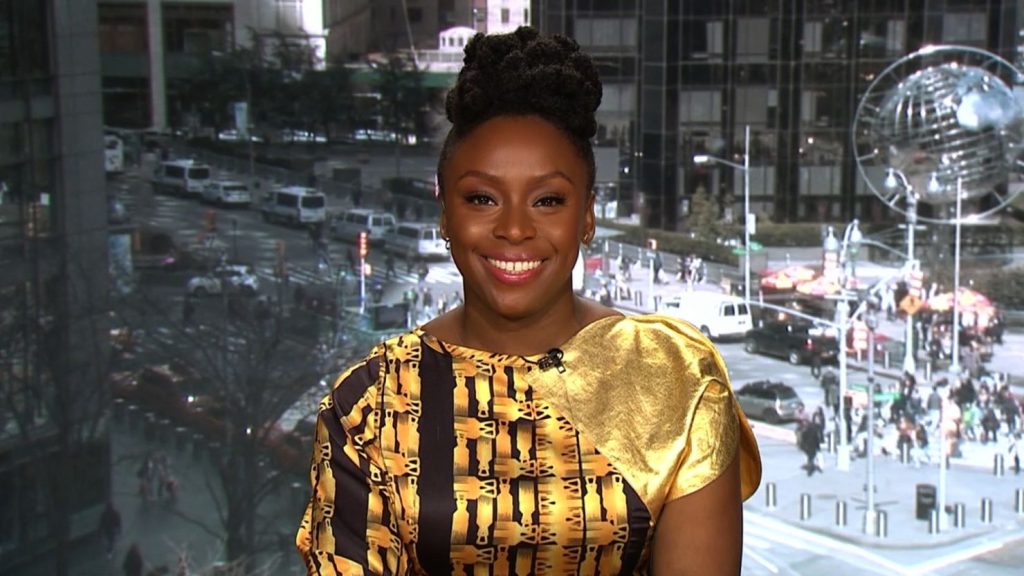
Nigerian women writers have emerged as powerful storytellers, fearlessly redefining narratives and challenging stereotypes across literary landscapes both locally and globally. From pioneering authors of earlier generations to contemporary stars reshaping genres, their influence transcends cultural boundaries—and their voices continue to resonate with readers worldwide.
1. Chimamanda Ngozi Adichie
Perhaps the most internationally recognizable name today, Adichie’s work spans novels, essays, and speeches that explore feminism, identity, and social justice. Her latest novel, Dream Count, navigates themes of exploitation, justice, and trauma across Nigeria and Washington, D.C. Adichie’s unapologetic voice and feminist advocacy—epitomized in her renowned TEDx talk and essay We Should All Be Feminists—continues to inspire writers and readers globally.
2. Ayọ̀bámi Adébáyọ̀
Debuting with Stay With Me (2017), which garnered global acclaim and multiple awards, Adébáyọ̀ excels in exploring complex personal and societal themes—infertility, marriage, gender roles, and societal pressure in a patriarchal context. Her follow-up A Spell of Good Things (2023) tackles class divisions and political turbulence, earning her a prestigious nomination for the Booker Prize.
3. Abi Daré
With her bestselling debut The Girl with the Louding Voice (2020), Daré introduced readers to a powerful voice of resilience in the face of oppression. Her sequel, And So I Roar, recently won the inaugural Climate Fiction Prize for its compelling portrayal of environmental injustice and the intersection of climate and gender struggles in rural Nigeria.
4. Nnedi Okorafor
A visionary in speculative fiction, Okorafor fuses African mythology with science fiction across works like the Binti trilogy and Who Fears Death. Her groundbreaking narratives have earned her awards such as the Hugo, Nebula, and Eisner—further expanding the reach of African storytelling in genre fiction.
5. Lesley Nneka Arimah
Arimah’s short fiction stands out for its emotional precision and narrative power. Her story collection What It Means When a Man Falls from the Sky won the Commonwealth Short Story Prize for Africa, and she later earned the O. Henry Prize, Kirkus Prize, and Caine Prize. Critics praise her ability to render entire lives with few, impactful lines of dialogue.
6. Chika Unigwe
Winner of the 2012 Nigeria Prize for Literature for her novel On Black Sisters’ Street, Unigwe writes fluently in both English and Dutch and serves as a mentor and literary advocate. She established the Awele Creative Trust to support emerging writers and has served as judge for prestigious awards like the Booker International and the Caine Prize.
7. Sefi Atta
Acclaimed for incisive explorations of women’s lives in modern Nigeria, Atta’s Everything Good Will Come earned the Wole Soyinka Prize and Noma Award. Her work highlights the gendered struggle for autonomy amid entrenched patriarchal norms.
8. Lola Akande
An academic and fiction writer, Akande’s novels—like What It Takes and The Truth about Sadia—navigate feminist themes, urban life, and social issues with nuanced insight. Her collection Suitors Are Scarce in Lagos won the Association of Nigerian Authors (ANA) Prize for Short Story.
9. Buchi Emecheta (1944–2017)
A foundational figure in African letters, Emecheta authored powerful works such as The Joys of Motherhood, Second Class Citizen, and The Slave Girl. Her fiction delved into motherhood, female independence, and the struggle for identity in colonial and postcolonial Britain. She remains celebrated for her courageous storytelling and lasting literary legacy.
10. Adaeze Atuegwu
Once Nigeria’s youngest prolific author, Atuegwu had published 17 books by the age of 17. Her literary output—spanning children’s stories, novels, and medical non-fiction—has been widely embraced by educational institutions across Nigeria, establishing her as an inspiring figure for young writers.
11. Balaraba Ramat Yakubu
A critical voice in Hausa-language literature, Yakubu is among the first women writing Littattafan Soyayya (“love literature”), blending traditional narratives with feminist commentary. Her novel Wa Zai Auri Jahila draws from her own experience as a child bride to highlight empowerment through education.
Why Their Voices Matter
Challenging Stereotypes & Cultural Norms
These authors dive into issues like gender inequality, traditional expectations, and urban versus rural tensions, offering fresh perspectives that disrupt the often simplistic portrayals of Nigerian women.
Diversity in Genre & Form
From speculative fiction (Okorafor) and climate-centered stories (Daré) to emotionally resonant literary fiction (Adébáyọ̀, Arimah) and feminist memoirs (Emecheta), their varied approaches reflect the richness and breadth of contemporary Nigerian literature.
Drawing Global Attention
Awards, international recognition, and translation into multiple languages ensure these stories reach diverse audiences—redefining how African narratives are read and valued around the world.
Nurturing New Voices
Authors like Unigwe and Atuegwu are investing in future generations—through writer residencies, creative trusts, and educational advocacy—ensuring that new Nigerian stories continue to emerge.
In Conclusion
Nigerian women writers are not simply authors; they are cultural architects—challenging norms, reshaping literary landscapes, and amplifying marginalized voices. Whether through groundbreaking fiction, genre-disrupting narratives, or educational outreach, they stand at the forefront of a literary renaissance that continues to resonate globally.
Would you like more insights into any specific author or book? I’d be glad to dive deeper!

